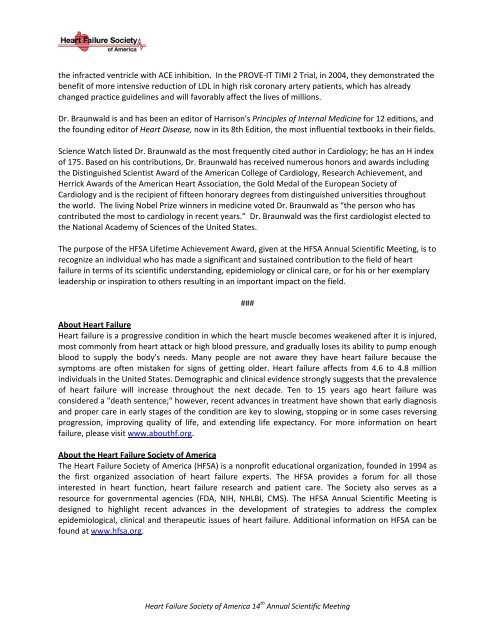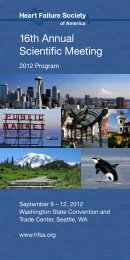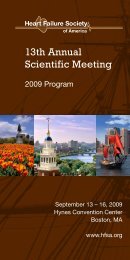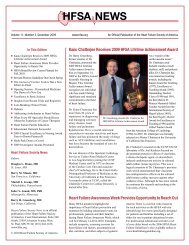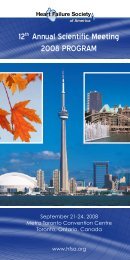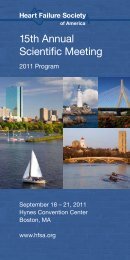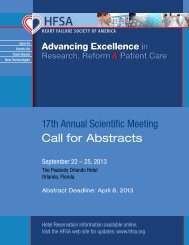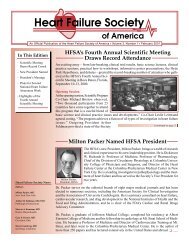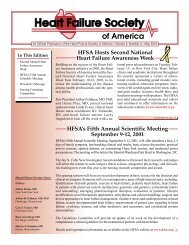DR. EUGENE BRAUNWALD RECEIVES HEART FAILURE ...
DR. EUGENE BRAUNWALD RECEIVES HEART FAILURE ...
DR. EUGENE BRAUNWALD RECEIVES HEART FAILURE ...
Create successful ePaper yourself
Turn your PDF publications into a flip-book with our unique Google optimized e-Paper software.
the infracted ventricle with ACE inhibition. In the PROVE‐IT TIMI 2 Trial, in 2004, they demonstrated the<br />
benefit of more intensive reduction of LDL in high risk coronary artery patients, which has already<br />
changed practice guidelines and will favorably affect the lives of millions.<br />
Dr. Braunwald is and has been an editor of Harrison's Principles of Internal Medicine for 12 editions, and<br />
the founding editor of Heart Disease, now in its 8th Edition, the most influential textbooks in their fields.<br />
Science Watch listed Dr. Braunwald as the most frequently cited author in Cardiology; he has an H index<br />
of 175. Based on his contributions, Dr. Braunwald has received numerous honors and awards including<br />
the Distinguished Scientist Award of the American College of Cardiology, Research Achievement, and<br />
Herrick Awards of the American Heart Association, the Gold Medal of the European Society of<br />
Cardiology and is the recipient of fifteen honorary degrees from distinguished universities throughout<br />
the world. The living Nobel Prize winners in medicine voted Dr. Braunwald as “the person who has<br />
contributed the most to cardiology in recent years.” Dr. Braunwald was the first cardiologist elected to<br />
the National Academy of Sciences of the United States.<br />
The purpose of the HFSA Lifetime Achievement Award, given at the HFSA Annual Scientific Meeting, is to<br />
recognize an individual who has made a significant and sustained contribution to the field of heart<br />
failure in terms of its scientific understanding, epidemiology or clinical care, or for his or her exemplary<br />
leadership or inspiration to others resulting in an important impact on the field.<br />
###<br />
About Heart Failure<br />
Heart failure is a progressive condition in which the heart muscle becomes weakened after it is injured,<br />
most commonly from heart attack or high blood pressure, and gradually loses its ability to pump enough<br />
blood to supply the body's needs. Many people are not aware they have heart failure because the<br />
symptoms are often mistaken for signs of getting older. Heart failure affects from 4.6 to 4.8 million<br />
individuals in the United States. Demographic and clinical evidence strongly suggests that the prevalence<br />
of heart failure will increase throughout the next decade. Ten to 15 years ago heart failure was<br />
considered a "death sentence;" however, recent advances in treatment have shown that early diagnosis<br />
and proper care in early stages of the condition are key to slowing, stopping or in some cases reversing<br />
progression, improving quality of life, and extending life expectancy. For more information on heart<br />
failure, please visit www.abouthf.org.<br />
About the Heart Failure Society of America<br />
The Heart Failure Society of America (HFSA) is a nonprofit educational organization, founded in 1994 as<br />
the first organized association of heart failure experts. The HFSA provides a forum for all those<br />
interested in heart function, heart failure research and patient care. The Society also serves as a<br />
resource for governmental agencies (FDA, NIH, NHLBI, CMS). The HFSA Annual Scientific Meeting is<br />
designed to highlight recent advances in the development of strategies to address the complex<br />
epidemiological, clinical and therapeutic issues of heart failure. Additional information on HFSA can be<br />
found at www.hfsa.org.<br />
Heart Failure Society of America 14 th Annual Scientific Meeting


